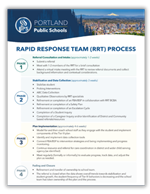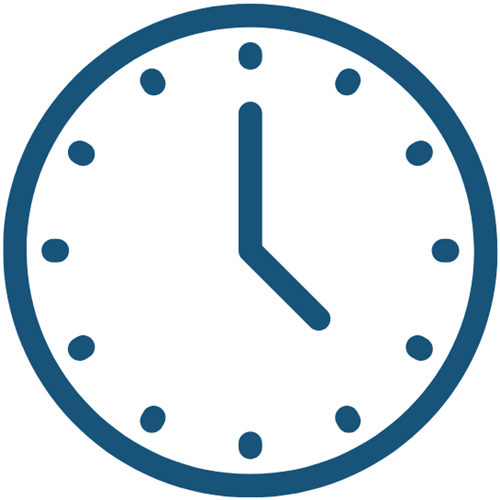-
RRT
 RRT is a district wide Tier III Behavioral Support resource for school based teams housed in Student Success and Health. RRT partners with school based staff to stabilize tier III behaviors, develop student centered plans for intervention and skills building and help school based staff strengthen tiered supports for successful student experiences in their neighborhood schools.
RRT is a district wide Tier III Behavioral Support resource for school based teams housed in Student Success and Health. RRT partners with school based staff to stabilize tier III behaviors, develop student centered plans for intervention and skills building and help school based staff strengthen tiered supports for successful student experiences in their neighborhood schools.We seek to:
- Create a culturally responsive and trauma-informed referral experience for the referred student by
- Modeling and coaching(for/with) school staff on the implementation of tiered interventions, best practices and resources for student growth to
- Increase the capacity and confidence of school teams to sustainably replicate tiered strategies, tools and interventions for any student in their school community.
-
Referral Requirements

Team Consensus and Commitment: All relevant team members (e.g., Teacher, Principal, Assistant Principal, Counselor) must be aware of and agree that a referral to RRT is necessary. They must also commit to actively participating in the process, which will include classroom observations, coaching, implementing interventions and strategies, and attending multiple meetings.

Senior Director Notification: The Senior Director of Schools must be notified of the referral.

Caregiver Awareness: The student's caregiver must be informed of the school's concerns and notified that their student is being referred to the RRT.

Caregiver Consent: The caregiver must have signed the consent form for RRT involvement or have been provided with the consent form and be in the process of considering their consent.
-
Please note: IF the student who demonstrates high risk behaviors has been found eligible for Special Education and has an implemented IEP, please do NOT refer to RRT. Instead, contact your designated Special Education staff for support. The Special Education Department will be the team's point of contact and RRT may be engaged by SpEd as a thought partner. See FAQ below for more details regarding this.
-
Phases of the RRT Process
-
1
Complete Referral Form & Schedule and Attend Intake Meeting: School Administrator or appointed staff fills out the RRT Referral Form. RRT arranges an intake meeting with the school team and assigned RRT staff.
-
2
Stabilize Student & Conduct Functional Behavioral Assessment/Behavior Support Plan: RRT performs observations, collects data, and assesses needs with the school team resulting in a FBA/BSP.
-
3
Implement Plan & Monitor Progress: School team executes the plan with RRT support through coaching, modeling, and regular communication. RRT and school team meet regularly to evaluate progress, track data, and adjust the Student Plan as needed.
-
4
Fading & Closure: Refinement and transfer of ownership to school team.
-
Frequently Asked Questions
-
Are there other Tier III supports a school team can access (aside from contacting RRT)?
Here are some identified Tier 3 resources that we recommend, along with regularly assessing and building Tier 1 and Tier 2 MTSS systems with assistance.
Schools may also want to consult with their school social workers, QMHPs, school counselors, school psychologists, or RESJ and other community partners who often know how to access timely mental health, culturally responsive, and behavioral support for individual students.
-
Should I call the Tier III Support Services (RRT) Team if a student or staff member is at imminent risk of harm?
Please call 988 for mental health crisis support
911 should be utilized when there is a life threatening emergency (serious bodily injury)
For a disciplinary issue/question, consider consulting with the PPS Student Conduct Coordinator
Other resources may include:
- Contact PPS Behavioral Safety Assessment System
- Contacting Student Success and Health for district mental health concerns, needs or questions
- Working with your building specialist staff (MSW, QMHP) to determine appropriate interventions for mental health and student safety.
- Debrief the situation with Student Conduct Coordinators
-
Does RRT serve students identified for Special Education Services?
Special Education will take the lead when a student already identified is exhibiting behaviors that possibly need Tier III intervention. The reason is that educational decisions for students receiving special education services should not be made outside of an IEP team and the RRT is not part of the IEP team. The guidance is for building SPED staff to contact their TOSA and then together make a decision about the PA being notified. From there, the PA would decide if and when a BCBA should be assigned to the case. BCBAs who work in the SPED dept are the staff in that dept. who are identified as taking the lead for Tier III, while RRT would be the team that would take the lead for a gen ed student who is referred. SPED can always request to consult with the RRT, in which case, RRT would support, consult, etc as a "backseat driver".
-
What type of behaviors or situations does RRT typically help to address?
RRT should not be considered as a resource for minor, repeated behaviors, such as, work refusal, yelling, tantrums, eloping to a predictable or safe location in a school (counselor's office, gym). RRT should be considered only after Tier 1,2 & 3 level interventions are in place and the school team has data demonstrating the behavior still continues. If you are not sure, please contact RRT for a consultation.
-
Can RRT provide 1:1 support for a student?
The Rapid Response Referral and process is unable to provide 1:1 supervision for a student as part of their school day.




